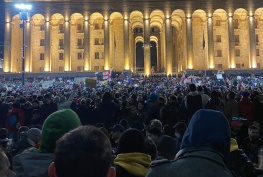Press freedom: How oppressed are you?
BY SHERIF TAREK, Daniel Pearl Fellow
“Have you faced pressure not to report certain issues?”
This is a question I have been asked quite frequently since I came here in the United States. The person who poses it usually expects a ‘yes’ answer, probably followed by unpleasant recollections of how my superiors didn’t want me to cross a line, state security inhumanely detained me for filing the wrong story, or Islamic extremists sent me death threats.
But the answer you get from an Egyptian journalist working in his turmoil-hit homeland like myself is actually ‘no’.
And instead of telling such painful experiences, to which I have never been subjected, I would talk about my publication’s working environment and editorial policy that, to the listener’s utter astonishment, has been greatly independent over the past four years.
That could be a little bit too hard to believe not only for foreigners, who might think press freedom in Egypt is as challenged as in Pakistan or Iraq, but for Egyptians as well. To begin with, the fact that my publication, Ahram Online, is owned by a state-run news organization doesn’t make my claim very plausible, especially for those who do not log on to the website regularly.
The daily Arabic Ahram paper is seen by many as the mouthpiece of the government. It is never easy, even for journalists, to be convinced that two products owned by the same news organization could be editorially different. I am not entitled to represent the daily paper but I can talk about AO, whose coverage and painstaking reporting, believe it or not, have been free and professional.
While having that conversation on how oppressed I am, I usually refer to probably the only, or most famous time AO came under pressure several months after the portal was launched.
It was late 2010 when former Al-Ahram daily editor Osama Saraia got a phone call from Mubarak’s interior minister Habib El-Adly. The minister said the English site needed to stop live reporting the blatant rigging of the parliamentary elections.
The Mubarak-loyal Saraia went to our office to tell our then editor-in-chief, Hani Shukrallah, about the call and asked him to stop the live blog covering the polls. Our chief editor continued the coverage and the blog is still online.
One of our reporters, meanwhile, was arrested in the field reporting about the voting. The policeman released her on condition that he “won’t see her again!” Unfazed by a repressive authority, like Shukrallah, she returned to the office to write about the notorious balloting.
I joined Ahram Online shortly after the uprising that toppled the Mubarak regime several months after that very same election. Ever since, not one time have I or my colleagues faced this kind of oppression, neither under the military rule, the Muslim Brotherhood’s Mohamed Morsi, nor after his ouster. Other journalists could’ve received certain instructions/orders regarding their work the past four years, but not us.
Back in 2010, our coverage for the election was considered unique. Apart from activists and citizen journalism not all Egyptian media outlets showed how horrendous the balloting violations really were. However, honest and comprehensive reporting on an election, or any other event, wouldn’t be rare these days.
Egypt’s press freedom, despite deterring other forms of freedom of expression, is still greater today than under Mubarak. There are quite a few brave journalists who speak out either against the regime or its figures in tones only very few adopted under Mubarak. Many taboos have been broken. A number of editors enjoy a higher degree of freedom and bravery that clearly reflect on their work.
Again, that could be hard to believe as reporters from pan-Arab satellite news network Al-Jazeera are now standing trial. Of course trying journalists on charges related to terrorism and detaining them for several months without introducing a single piece of evidence against them doesn’t induce foreigners to think very highly of press freedom in Egypt.
The trial seems embarrassing and unfair. What may not be clearly understood is that it’s not part of a crackdown on media freedom, but part of a publicly-supported onslaught on the Muslim Brotherhood and its allies. Al-Jazeera’s Arabic channel has been widely deemed the main biased media arm of the Islamist group. Thus, the aforementioned journalists are paying the price for it, though they work for the English channel whose editorial policy is different from the Arabic channel but again, only few would tell the difference.
Press freedom in Egypt might not be suffering as flagrant encroachment from authorities as under Mubarak, but it has been facing other stern challenges. One of them is the hysterical rise of the anti-Brotherhood and pro-army media outlets that took it upon themselves to “fight terrorism” instead of reporting the truth objectively. Another is the public’s inability to hear or read anything but what they want to receive, which is a reason why prejudiced media in Egypt is thriving amid constant attempts to demonize opposing views.
Another hurdle is the danger journalists in Egypt are exposed to, thanks to evolving political disputes and ensuing frequent clashes between political factions and security forces that saw hundreds killed since 2011. Attacks from people who don’t like your media house are always on the cards, not to mention a more recent cluster of bombings by Islamist militants.
Five reporters were killed on duty on three different occasions in 2013, another one in 2014, while others were injured. Journalists blame police for failing to provide protection for them. Others accuse security personnel of firing at journalists while clashing with protesters. And of course reporters would be prone to arrests when the police capture protesters.
We are yet to see how the next administration’s policies would affect press freedom. Some steps taken lately, including introducing a legislation that curb the right to protest and coming down hard in many ways on opposition groups even the non-Islamist ones, raise concerns and leave no doubt that whatever freedom journalists in Egypt have nowadays cannot be taken for granted.
Egyptian journalists need to keep fighting to maintain and expand it.




